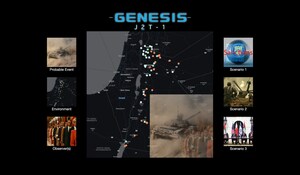Impact of Geosystem Co-Exposures (Environmental, Disease, and Toxin Variables) on Individual Health Profiles; Dynamic Individualized Susceptibility Alerts, Notifications, Maps in Geolocation-Time-Intervals
NEW YORK, Dec. 4, 2023 /PRNewswire/ -- Jumptuit Health announces the launch of Genesis J2T-H1, AI-Assisted genome-environment geolocation exposure scenario forecasting to provide forewarning of probable impacts of environmental, disease, and toxin variables on individual health profiles. Genesis J2T-H1 provides Dynamic Individualized Susceptibility Alerts, Notifications, and Maps in geolocation-time-intervals for private and public sectors employees.
Jumptuit's Genesis J2T-H1 is based on Jumptuit's Event Genesis Intelligence (EGI) that identifies the geolocation-time-intervals of future conditions, exposures, and events and generates adaptive scenario forecasting, based on continuous analyses of Real-Time-Cross-Spectrum-Data (RTCSD) captured via Jumptuit's Global Data Nets (GDNs).
Genesis J2T-H1 uncovers probabilities of conditions, exposures, and events prior to activities commencing and actions being taken. Insights are granular, down to an individual employee's geolocation, travel schedule, activities and workflow, and at virtually any geo-coordinate.
Geosystem phenotypes include highly localized atmospheric, water, and soil conditions and compositions; flora, fauna, and biome populations and expressions; topography (implying pressure, altitude, temperature gradients, and sunlight exposures); climate subsystems; and, abiotic pressures on these local environmental conditions and their natural and adapted responses.
Jumptuit's EGI recognizes important individualized thresholds for the spread of transmissible illnesses and diseases, including by geolocation (e.g., Influenza, Bronchiolitis and Respiratory Syncytial Virus (RSV)), activity (e.g., restaurant-spread concerns or community gatherings), and travel (e.g., idiopathic Pediatric Hepatitis now in 47 states). Jumptuit's GDN captures and discriminates thresholds for responses to natural and abiotic conditions, including changes in temperature, humidity, and pressures, as well as human-generated triggers causing allergic, illness, and disease-generating sensitivities derived from contaminants in soil (especially for children), water (e.g., potable and recreational), and airborne pollutants (e.g., downwind from manufacturing and agriculture centers).
The Genesis J2T-H1 data system continually builds granular dynamic geolocation data sets and maps of exposures for each individual that are potentially detrimental to an individual's personal health profile and delivers exposure warnings or other information about exposure risks to the user.
"As the Genesis J2T-H1 geolocation data system dynamically receives more data on current exposure variables, machine learning models identify patterns in terms of variables that trend together, and the sequence/order in which the variables move and the velocity of movement of each respective variable in relation to the other variables," said Founder and CEO, Donald Leka. "Confidence levels of current forecasted exposures are compared with recently stored variable behaviors and associations that allow for health alerts, notifications, and maps to be generated with longer range forecasts and with greater accuracy."
The Genesis J2T-H1 risk analysis engine implements algorithms to sum the risk factor numerical score for each single variable and each coupled variable where a threshold has been crossed and calculates an aggregate risk score. Aggregate risk scores are determined for individuals in geolocation-time-interval tuples.
Jumptuit Editorial Contact:
Drew De Risi
Jumptuit
917.650.1359
[email protected]
SOURCE Jumptuit

WANT YOUR COMPANY'S NEWS FEATURED ON PRNEWSWIRE.COM?
Newsrooms &
Influencers
Digital Media
Outlets
Journalists
Opted In





Share this article